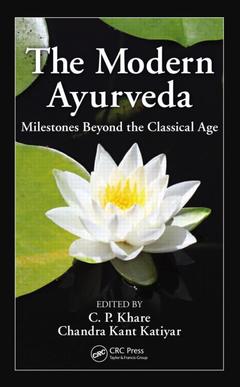The Modern Ayurveda Milestones Beyond the Classical Age
Coordonnateurs : Khare C. P., Katiyar Chandra Kant

The Indian population has used Ayurvedic herbs for centuries, but now modern scientific work has led to recognition and acceptance at a global level. The major cause of the increased popularity of Ayurvedic medicine stems from recent scientific validation and its potential in lifestyle management. This growth in research in India and worldwide has created the need for a resource covering the scientific development of Ayurvedic herbs for practice during the postclassical period. The Modern Ayurveda: Milestones Beyond the Classical Age explores a host of topics essential to understanding the surge of scientific work now being conducted on this ancient practice.
A one-point source for the modern explorer attempting to appreciate the transformation of Ayurveda from an empirical to a rationalist understanding, the book enumerates more than 400 Ayurvedic herbs with compiled information including their botanical name, common Ayurvedic name and family, their attributes, chemical constituents, phytochemical markers, pharmacological actions, and their interactions and toxicity. It explores current research methodologies for the evaluation of efficacy and safety of herbal medicine and discusses the contemporary international regulatory status of herbal drugs.
Ayurvedic medicine can be better understood and utilized through the application of modern scientific analytical tools for standardization, modern pharmacological tools for safety and efficacy evaluation, and the application of biotechnology to elicit the mechanism of drug actions. Bringing Ayurveda into the 21st century, this volume will inform further progress and open new doors to treatment.
This is how the concept of Modern Ayurveda emerged. Transition from Ancient to Modern Ayurveda. Ayurveda and Traditional Chinese Medicine: Challenges and strategies. Herb nomenclature of the last classical Ayurvedic treatise: Bhavaprakasa. Classical attributes of Ayurvedic herbs. Bioactive constituents of medicinal plants. Chemical constituents of Ayurvedic herbs. Phytochemical markers of Ayurvedic herbs. Interaction/leads/toxicity of Ayurvedic herbs. Modern pharmacological classification of Ayurvedic herbs. Evaluation of efficacy and safety of Herbal/Ayurvedic medicines. International regulatory status of Herbal Drugs. Information resources.
Date de parution : 04-2012
Ouvrage de 414 p.
15.6x23.4 cm
Thèmes de The Modern Ayurveda :
Mots-clés :
Ayurvedic Medicines; Classical Ayurvedic Medicines; withania; Herbal Drugs; somnifera; NMPB; nardostachys; Traditional Medicine; jatamansi; Modern Ayurveda; convolvulus; Ayurvedic Products; pluricaulis; Withania Somnifera; swertia; Herbal Medicine Product; chirayita; OECD Test; abies; Natural Health Products; spectabilis; OECD Test Guideline; Southeast ASIA; Sri LANKA; Ayurvedic Scholars; Asparagus Racemosus Willd; Cab International; FDA Poisonous Plant Database; Essential Oils; Cardamomum Maton; CDRI; Eugenia Caryophyllata; Eugenia Aromatica; Ayurvedic Drugs; Domestica Valeton



